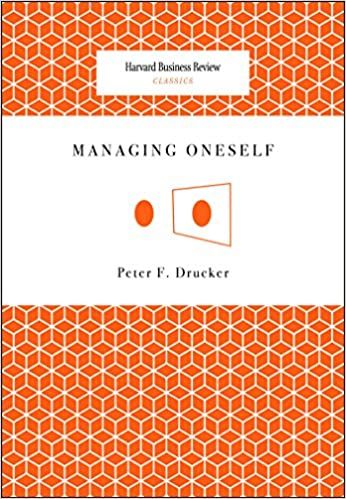Managing Oneself
by Peter Drucker

Troy Shu
Updated at: February 23, 2024


What are the big ideas? 1. To find your strengths, write down your expectations when you make decisions, then later check the results. 2. Know if you learn better b
Want to read ebooks, websites, and other text 3X faster?
From a SwiftRead user:Feels like I just discovered the equivalent of fire but for reading text. WOW, WOW, WOW. A must have for me, forever.
What are the big ideas?
- To find your strengths, write down your expectations when you make decisions, then later check the results.
- Know if you learn better by reading or listening, and understand your work style, like if you prefer working with others or alone.
- Your values should match your workplace's values; if not, you might feel unhappy and perform poorly.
- By your mid-twenties, you should know your strengths, how you work best, and what you value to find the right career.
- Planning a second career can keep you motivated and engaged, especially if you start thinking about it before you turn 40.
Summary
Discovering and Leveraging Your Strengths Through Feedback Analysis
- “The only way to discover your strengths is through feedback analysis. Whenever you make a key decision, or take a key action, write down what you expect will happen. Nine or 12 months later, compare the actual results with your expectations.”
- Feedback analysis reveals where your strengths lie. Moreover, it highlights what you are doing or failing to do to take full advantage of your strengths.
- Following any feedback analysis, put yourself where your strengths can produce results, work on improving your strengths, and discover where your intellectual arrogance is causing disabling ignorance and overcome it.
- “Work on acquiring the skills and knowledge you need to fully realize your strengths.”
Understanding Your Personal Learning Style and Performance
- “The first thing to know about how you perform is whether you are a reader or a listener. The second thing to know is how you learn.”
- “Of all the important pieces of self-knowledge, understanding how you learn is the easiest to acquire.”
- Drucker says the first questions to ask when understanding how you learn is, “Am I a reader or a listener?” and “How do I learn?” To manage yourself effectively, you also have to ask, “Do I work well with people, or am I a loner?” And if you do work well with people, you must ask, “In what relationship?”
The Role of Personal Values and Work Environment Compatibility
- “To be able to manage yourself, you finally have to ask, What are my values?” This is not a question of ethics, but of compatibility with an organization's value system.
- Working in an organization whose value system is unacceptable or incompatible with your own condemns the person both to frustration and nonperformance.
Planning for a Successful Career Based on Self-Knowledge
- By your mid-twenties, you should know the answers to three questions: “What are my strengths?” “How do I perform?” and “What are my values?” And then you can and should decide where you belong.
- “Successful careers are not planned. They develop when people are prepared for opportunities because they know their strengths, their method of work, and their values.”
Managing Yourself and Your Relationships in the Workplace
- Managing yourself requires taking responsibility for relationships, which has two parts: understanding others' strengths, performance modes, and values, and communicating your own.
- “The second part of relationship responsibility is taking responsibility for communication. Don’t be afraid to say, “This is what I am good at. This is how I work. These are my values. This is the contribution I plan to concentrate on and the results I should be expected to deliver.”
Preparing and Transitioning to a Second Career
- Druckers explains that today’s knowledge workers are bored after working for 40 years, and therefore, start a second career to learn something new or contribute to their community.
- There are three ways to develop a second career: starting one, developing a parallel career, or moving into a different field like nonprofit work after a successful first career.
- The prerequisite for managing the second half of your life is beginning long before you enter it. If you don’t start volunteering before you’re 40, you likely won’t once past 60.
Questions
- How often do you analyze the outcomes of your decisions and actions to discover your true strengths?
- What steps can you take to improve and fully utilize your identified strengths?
- Are you more of a reader or a listener, and how does this affect your learning and working style?
- How do your personal values align with your current work environment, and how does this impact your performance?
- What are your answers to the questions: "What are my strengths?" "How do I perform?" and "What are my values?"
- In managing yourself at work, how do you understand and communicate with colleagues who have different strengths and values?
- Have you considered starting a second career or a parallel career, and what motivates this decision?
- If you plan to start something new later in life, what steps are you taking now to prepare for that transition?
Discussion
What do you think of "Managing Oneself"? Share your thoughts with the community below.